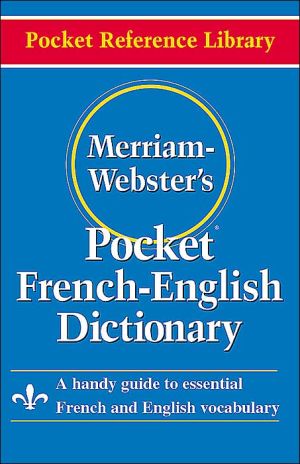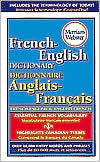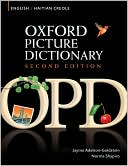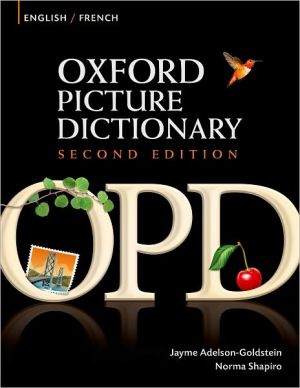Collins Robert French Unabridged Dictionary
The Collins Robert French Unabridged Dictionary is simply the best French dictionary you can own. Here's why:\ More than 820,000 entries and translations. The Collins Robert French Unabridged Dictionary gives you comprehensive coverage of both French and English and the most up-to-date business, political, and technical terms. Native French and English speakers worked side by side to create a balanced treatment of both languages and to make authentic and appropriate translations.\ Most...
Search in google:
The Collins Robert French Unabridged Dictionary is simply the best French dictionary you can own. Here's why: More than 820,000 entries and translations. The Collins Robert French Unabridged Dictionary gives you comprehensive coverage of both French and English and the most up-to-date business, political, and technical terms. Native French and English speakers worked side by side to create a balanced treatment of both languages and to make authentic and appropriate translations. Most consistently updated. This edition has been extensively revised and updated to cover all the vocabulary of today's French, including new phrases and indicators. In addition, this Unabridged edition includes exhaustive coverage of key works, and full treatment of irregular forms of verbs, nouns, and adjectives to create the most complete and accurate picture of real language available today. More colloquial usage than any other French dictionary. With its emphasis on current French and English, both written and spoken, including all areas of modern life and featuring regional usage, the dictionary gives you the edge in finding the correct translation.
Collins Robert French Unabridged Dictionary, 8th Edition By Jen HarperCollins HarperCollins Publishers, Inc. Copyright © 2007 Jen HarperCollins All right reserved. Points to Remember When Using Your Dictionary 1. Words can have several meanings—don't stop at the first translation In this dictionary, each different meaning is preceded by a letter in a blue circle. The most frequent meaning comes first. Where necessary there are labels (italic words in brackets) to show which sense is being translated. The noun key has meanings (a), (b), (c) and (d). If you want the key you find on a computer keyboard, you need to scan down the letters to (c) [of piano, computer]: key /ki:/ 1 N (a) clé (f); leave the ~ in the door laisse la clé sur la porte; he holds the ~ to the mystery il détient la clé du mystère; the ~ to ending this recession la solution pour mettre fin a la rècession (b) (to map, diagram) lègende (f) (c) [of piano, computer] touche (f) (d) [of music] ton (m); in the ~ of C en do; in the major ~ en mode majeur; change of ~ changement (m) de ton 2 ADJ (= crucial) clé (inv) 3 vt (also ~ in) [+ text, data] saisir 4 COMP • key ring N porteclés (m) The French noun boîte has meanings(a), (b), and (c)--make sure that you choose the translation that fits the context:boîte /bwat/ 1 NF (a) (= récipient) box; (en métal) tin; [deconserves] can, tin (Brit); des tomates en boîte canned ou tinned (Brit) tomatoes; mettre qn en ~* to pull sb's leg*(b) (= cabaret)* nightclub; sortir en ~ to go clubbing*(c) (= lieu de travail, firme)* company; (= école)* school; elletravaille pour une ~ de pub she works for an advertisingcompany 2. Words often have more than one function in a sentence The word key can be a noun, an adjective or a verb. To translate key in your number, you need a French verb, so scan down to the verb section, which is number 3. The word fast can be an adjective (section 1): she's got a fast car, or an adverb (section 2): she drives too fast. fast /fa:st/ I AD) (~) (= speedy) rapide; she's a ~ walker/reader elle marche/lit vite; to pull a ~ one on sb* roulerqn*; my watch is five minutes ~ ma montre avarice de cinqminutes(b) [colour] is the dye -? est-ce que ça déteindra ? 2 ADV (a) (= quickly) vite; the environment is ~ becoming a major political issue l'environnement prend une place de plus en plus importante dans les débats politiques; he ran off as ~ as his legs could carry him il s'est sauvé ~ toutes jambes; not so -1 (interrupting) pas si vite!* (b) (= firmly) to be ~ asleep dormir A poings fermés; to be stuck ~ &re coincé; to stand ~ tenir bon Some words such as can1 (= to be able) and can2 (for oil, petroh are so different that they are treated in different entries, with the numbers to distinguish them. Some of these words look the same but are pronounced differently, such as lead1 (verb) and lead2(= metal. 3. There are different kinds of verb If you look up grow you will find that the entry is divided into two sections: VI (intransitive verb) and VT (transitive verb). A verb with no object is VI: lettuces grow fast, a verb with an object is VT: the farmers grow wheat. For the VI example the translation is pousser, for the VT example it is cultiver. Remember this distinction, so that you can go immediately to the correct section. 4. Phrases aren't always translated word for word Look carefully at example phrases--they are there to help you get not just the word, but the whole sentence right. In the entry key you will find: key /ki:/ 1 N (a) clé (f); leave the ~ in the door laisse la clé sur la porte You might not have expected sur as a translation of in. the ~ to ending this recession la solution pour mettre fin A la réession Here clé is not used at all. 5. Use both sides of the dictionary When you are translating into French you naturally use the English side first. You can find additional information on the French side. The English side, for example, tells you that one translation for to take out is sortir. If you then look up sortir you will also learn how to pronounce the word, where to find it in the verb tables if you need to form a particular tense, and whether to use avoir or être with it. sortir /sortir//TABLE 16/1 VERBE INTRANSITIF2 VERBE TRANSITIF3 VERBE PRONOMIAL • sortir is conjugated with être, unless it has an object when the auxiliary is avoir. 6. Suit language to situation The dictionary uses * to mark language which is colloquial, ** indicates slang, and *** indicates rude language. You wouldn't use colloquial language, such as my mates, in a formal situation. In French, boulot and travail both mean work, but boulot is colloquial, so would be unsuitable in a job application: boulot2* /bulo/ NM (a) (= travail) work (NonC); on a du ~ we've got work to do; (= tâche difficile) we've got our work cut out; elle a fait du bon ~ she's done a good job; se mettre au ~ to get down to work; allez, au ~ I OK, let's get cracking!.* (b) (= emploi) job; il a trouvé du ~ ou un ~ he's found a job; j'ai fait des petits ~s I did casual work (c) (= lieu de travail) work (NonC); aller au ~ to go to work; je sors du ~ à 18h I finish work at 6 o'clock Continues... Excerpted from Collins Robert French Unabridged Dictionary, 8th Edition by Jen HarperCollins Copyright © 2007 by Jen HarperCollins. Excerpted by permission. All rights reserved. No part of this excerpt may be reproduced or reprinted without permission in writing from the publisher.Excerpts are provided by Dial-A-Book Inc. solely for the personal use of visitors to this web site.








